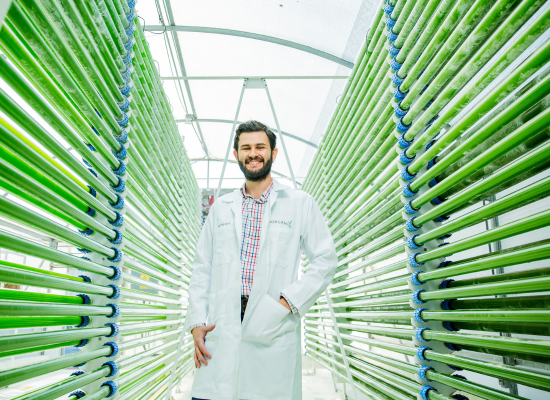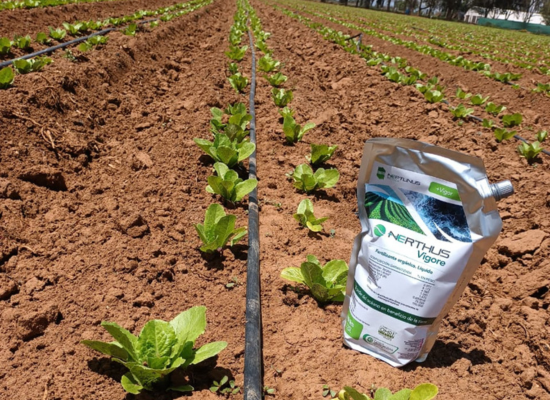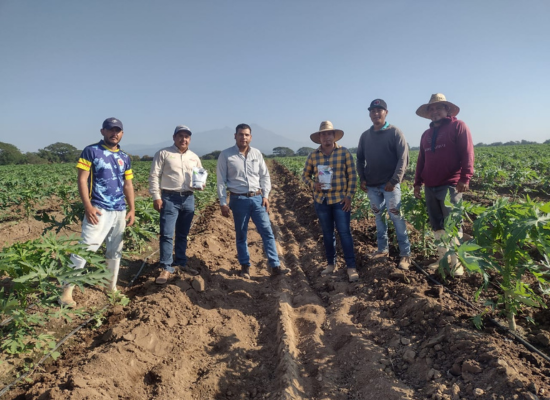Harnessing the power of plants´ ancestors
Neptunus´ story started around 2016, when Leopoldo Herrera (founder& director) was leading a R&D project resulting from a scientific cooperation between Mexico and the UK. In the cooperation project, which received funding from CONACYT and Innovate-UK in 2017, the research team focused on identifying and selecting microalgae species containing bioactive compounds that positively influenced plant growth. The inception of this project traces back to a pre-screening of a microalgae collection done in 2012.
"From a large pool, we narrowed the selection to a handful of strains that exhibited robust plant growth-promoting bioactives and the ability to scale up their cultivation"
, states Leopoldo. This collaboration involving experts from industry and academia across both countries culminated in a production process for selected microalgae species and their valuable bioactive compounds. The start-up was founded to bring the products, that resulted from the project, to the agricultural market. The interest for agricultural topics and thus the inspiration for the topic of the project developed in Leopoldo´s childhood: Growing up in a 3rd generation of farmers, Leopoldo experienced agricultural work from a young age and was confronted with all its hardships and dangers first hand. The biggest problem he saw in the extensive use of toxic chemicals, which not only and mostly present a health risk to the farmers, but also are passed on to the consumer via the product. Furthermore, with changing environmental and climate condition farmers today need to produce a certain quality and quantity of food, despite of the hardened conditions and constantly growing population. Leopoldo understood the need for tools that would help the farmers in that task without risking their health.
Leopoldo is a biotechnologist, who holds a degree in chemical engineering and also has experience in business. His team now consists of four agronomists and a postgraduate training on business and management.
The biggest challenge so far, according to Leopoldo, is being able to scale quickly. As agriculture is a very conservative market, it takes a lot of effort to introduce a new technology. The market also proves to be extremely volatile, because farmers payment fluctuates depending on their harvest. On one hand it makes them very risk averse and on the other hand it also has an element of risk for innovators trying to establish new products, since payments from the farmers are difficult sometimes. Luckily, products are judged on their performance, which the start-up has been very content with.
“So it does take time to make a farmer test a new technology, but once they see a benefit, they usually become loyal. We're seeing that here over the years and I'm happy about it.”
, states Leopoldo. The name of the start-up was formed to underline the power of microalgae. The little organisms are very powerful, as they were the first to produce oxygen by binding carbon dioxide via photosynthesis and the first to start life on earth itself. As these ancestors of plants come from the sea, the start-up wanted to choose a fitting name, “as powerful as the ocean”. Coming from the founders liking of ancient mythology, Neptunus – the mighty god of the sea in Roman mythology – was chosen as the name of the start-up.
Green technology to protect the whole production cycle
To tackle the increasingly poor performance of crops due to environmental stress the start-up developed a set of bio-stimulants based on extract of microalgae from strains of different species. The specific formulations are applied to specific stages of development of the crop. The different solutions either focus on initial stages of plant development, plant growth, flowering or deficiencies in nutrition, that are also related to stress. This stress can be environmental, such as drought, extreme temperature or mechanical and chemical damage by machinery, synthetic pesticides and fertilizers.
The initial hypothesis for using microalgae was that these organisms are the evolutionary ancestors of all crops and plants, making them very compatible and easily assimilated by the latter. They contain all the compounds and building blocks for molecules that are needed in plants. By the time Leopoldo started with research, little studies existed on their use in agriculture. Naturally, the process of testing around 100 species of microalgae to examine their effect and find the useful ones took several years of time.
The most significant aspect of sustainability can be explained as follows: Other existing products on the market, based on synthetic phyto-hormones or growth regulators, tend to have high negative impact on the soil, product, farmer and consumer – basically the whole production cycle – because of their chemical toxicity.
“It is very important that we keep our soils healthy, if we want to survive in this planet.”
, says Leopoldo. Neptunus´ products also do not require a harsh extraction process with strong acids or bases for cell breakdown, like most other products. The use of microalgae not only increases the plants resilience towards environmental stress, but also reduces the carbon footprint of agrochemicals by the microalgae´s natural ability to fix CO2 via photosynthesis. The problem of toxicity of agricultural fertilisers does not exist with this product, based on naturally occurring organisms.
Currently, the start-up offers six products, focusing on agricultural use. All products have names derived from Greek or Roman or Germanic mythology, e.g. the bio-stimulant for crops is called “Nerthus” – like the Germanic goddess of prosperity and fertility.
Next steps for Neptunus Biotech
The start-up is thinking about expanding their portfolio by a product focusing on drought stress this year and another one focusing on fungal prevention next year. As the start-up has almost reached full capacity of their pilot plant, Neptunus is looking for investment to continue producing their innovative product in bigger quantities. The team will also need to expand in the commercial field. Neptunus Biotech, who joined the ISC3 Global Start-up Service in July 2023 as one of the ISC3 Innovation Challenge 2023 finalists, is actively contributing to SDG 2 (zero hunger), SDG 12 (responsible consumption and production), SDG 15 (life on land).




